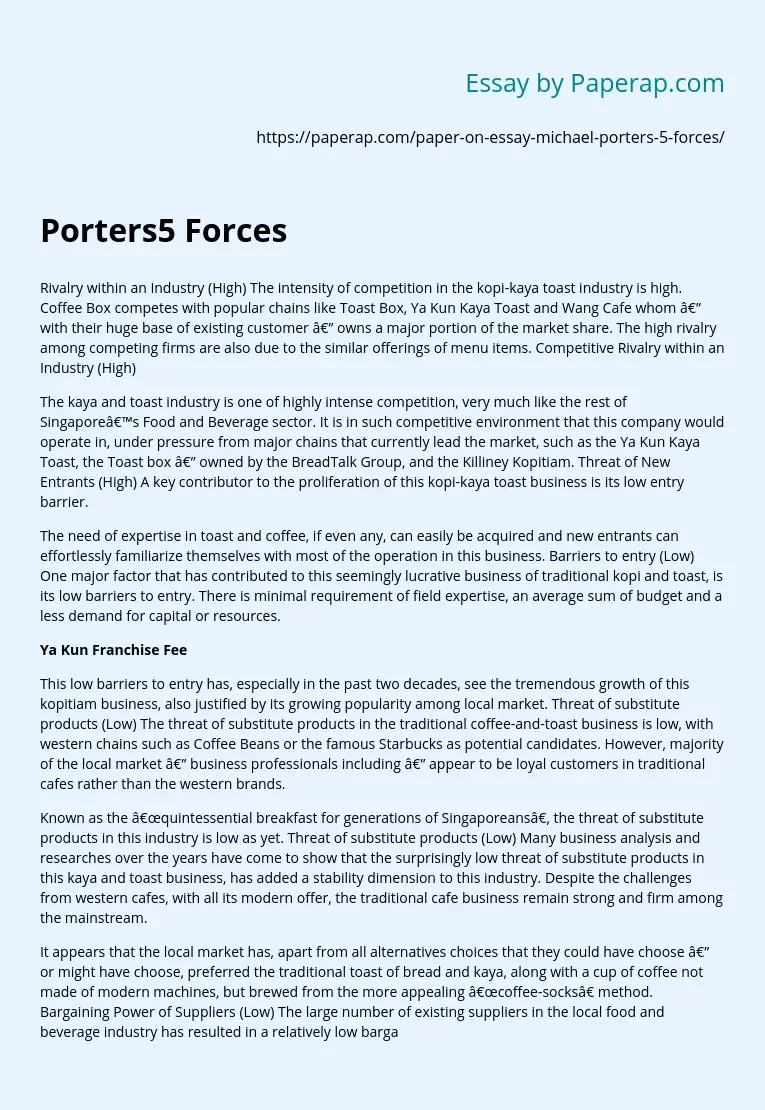Porters5 Forces
Rivalry within an Industry (High) The intensity of competition in the kopi-kaya toast industry is high. Coffee Box competes with popular chains like Toast Box, Ya Kun Kaya Toast and Wang Cafe whom — with their huge base of existing customer — owns a major portion of the market share. The high rivalry among competing firms are also due to the similar offerings of menu items. Competitive Rivalry within an Industry (High)
The kaya and toast industry is one of highly intense competition, very much like the rest of Singapore’s Food and Beverage sector.
It is in such competitive environment that this company would operate in, under pressure from major chains that currently lead the market, such as the Ya Kun Kaya Toast, the Toast box — owned by the BreadTalk Group, and the Killiney Kopitiam. Threat of New Entrants (High) A key contributor to the proliferation of this kopi-kaya toast business is its low entry barrier.
The need of expertise in toast and coffee, if even any, can easily be acquired and new entrants can effortlessly familiarize themselves with most of the operation in this business.
Barriers to entry (Low) One major factor that has contributed to this seemingly lucrative business of traditional kopi and toast, is its low barriers to entry. There is minimal requirement of field expertise, an average sum of budget and a less demand for capital or resources.
Ya Kun Franchise Fee
This low barriers to entry has, especially in the past two decades, see the tremendous growth of this kopitiam business, also justified by its growing popularity among local market.
Threat of substitute products (Low) The threat of substitute products in the traditional coffee-and-toast business is low, with western chains such as Coffee Beans or the famous Starbucks as potential candidates. However, majority of the local market — business professionals including — appear to be loyal customers in traditional cafes rather than the western brands.
Known as the “quintessential breakfast for generations of Singaporeans”, the threat of substitute products in this industry is low as yet. Threat of substitute products (Low) Many business analysis and researches over the years have come to show that the surprisingly low threat of substitute products in this kaya and toast business, has added a stability dimension to this industry. Despite the challenges from western cafes, with all its modern offer, the traditional cafe business remain strong and firm among the mainstream.
It appears that the local market has, apart from all alternatives choices that they could have choose — or might have choose, preferred the traditional toast of bread and kaya, along with a cup of coffee not made of modern machines, but brewed from the more appealing “coffee-socks” method. Bargaining Power of Suppliers (Low) The large number of existing suppliers in the local food and beverage industry has resulted in a relatively low bargaining power of suppliers. Suppliers in this industry are weak in terms of bargaining power, also due to the standardized pricing of ingredients like flour and eggs.
The quality of such ingredients do not vary significantly in quality, which also contributed to lowering the bargaining power of suppliers. Bargaining Power of Suppliers (Low) The huge amount of suppliers in the coffee and toast business, which apparently is still growing in numbers, has given the traditional cafe owners substantial amount of bargaining power over themselves. A more informal way of saying it is that traditional cafe owners in this business are in fact, spoiled with choices, and not without reason.
It is because most owners in this industry are operated on a franchise model, or on a similar chains model, their bulk purchasing have lend them significant strength which favors them over suppliers in negotiating terms. Bargaining Power of Customers (High) Customers are powerful in terms of making decision given the wide variety of choices in this sector. Customers are able to switch between choices, depending on factors like price and place (location). The local cafe business that has been flourishing in the recent past years also ensure a low switching cost that guarantee customers substantial purchasing power.
Bargaining Power of Customers (High) The customers have a good reason to embrace the flourishing of this traditional cafe business, as it now means that they would have the luxury of choosing from a wide variety of choices for their moment of traditional coffee, or more commonly known as ‘kopi’, and the favourite kaya toast. A high bargaining power of customers explains a freedom to choose between options, with a low switching cost. Price-sensitive customers would opt for cheaper alternatives and companies should be well aware of this ‘buying power’ in order for them to remain competitive in business.
Porters5 Forces. (2019, Dec 05). Retrieved from https://paperap.com/paper-on-essay-michael-porters-5-forces/

